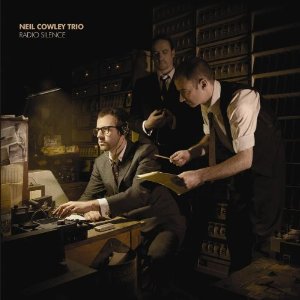Neil Cowley Trio ‘Radio Silence’
As a 10 year old child protégé he performed a Shostakovich piano concerto to an audience of 1200 at London’s Queen Elizabeth Hall. Having answered an ad in Melody Maker at 17, he entered the world of pop, and by 21 had performed to over 5,000 at the Royal Albert Hall. In 2002, Q Magazine described his music as “beautiful and delicate”, while The Independent on Sunday added “sweeping and epic.” Yet just two years ago, London born pianist-composer Neil Cowley was locked in a damp dark room with a few keyboards and an apple mac, desperately “trying to extract creative art from within.” An experience he refers to as “lonely and depressing.” Neil Cowley turned his back on the Royal Academy at an early age, choosing instead to record and tour with some of the best soul and funk bands of the day, including The Brand New Heavies and Zero 7, until in 2002 he formed his own band, Fragile State. As one half of the production duo, Cowley produced two critically acclaimed albums that set the world of jazzy chill-out music alight. Yet when the record company dissolved, the act went down with the ship, and with it, his heart and soul. Cowley continued to make music, yet found the experience of extracting music from a computer chip unbearable. So, he called on the oldest friend he had - his dear old piano, and set forth with a renewed enthusiasm to present creativity without technological hindrance. Cowley began composing, embarking on late night sessions of piano discovery.
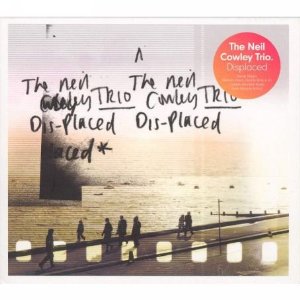 The result was DISPLACED, an outstanding album of original recordings that present Cowley as a thoroughly modern player with an impeccable touch. As a pianist, Neil Cowley is dazzling, and as a composer he is stunning. With Richard Sadler on double bass, and Evan Jenkins on drums, Cowley has assembled a masterful jazz trio, whose bursts of energy and emotional infectiousness underpin Cowley’s tremendous flair for creating beautiful, sometimes forceful melodies.
The result was DISPLACED, an outstanding album of original recordings that present Cowley as a thoroughly modern player with an impeccable touch. As a pianist, Neil Cowley is dazzling, and as a composer he is stunning. With Richard Sadler on double bass, and Evan Jenkins on drums, Cowley has assembled a masterful jazz trio, whose bursts of energy and emotional infectiousness underpin Cowley’s tremendous flair for creating beautiful, sometimes forceful melodies.
Having rehearsed the material for one week, The Neil Cowley Trio recorded Displaced in one take over two days at Real World Studios. For Cowley, the tunes on DISPLACED had to tick the boxes of the past masters that live on his shoulders. Shostakovich, Ahmad Jamal, Frank Zappa, Errol Garner, Taraf de Haidouks. “I love a chord!” he says, “My chords always come before my melody. Each chord has to have its own life and story and touch on something I feel. The melody is often how my fingers play around those chords.”
It could be argued that Cowley’s latest album, RADIO SILENCE , is his trio’s best to-date. But that would be wrong as musicians as good as this use time and place as a song writing signpost; a snapshot of life - good times and bad. However, what is clear from listening to this album, Cowley is in a good place right now, and has recorded a jazz record of supreme elegance, with the optimum level of accessibility. While his obsession with chord structures is a given, RADIO SILENCE reveals a sense of melody that in my experience is rare. RADIO SILENCE is an album that would fit comfortably in anyone’s record collection, and for those who value the highest quality level of music reproduction, it’s a special treat.
‘Monoface’ opens the album on a classical, sombre, dark note, and at deathly pace. Then drums and piano hustle forth with vigour to reveal a song that, while reflective, communicates contentment. The melody is astonishingly strong, the pace diverse, and the whole is one of the most powerful, rocky jazz compositions I’ve heard, beautifully executed. ‘Radio SIlence’ has a threatening, foggy opening but Cowley’s piano then arrives to convey a picture of thoughtful tranquility, underlined by Richard Sadler’s lyrical bass and Evan Jenkin’s brushed drums. Cowley then comes back with piano notes that soar with what I can only describe as momentary joy, before settling back to calm contemplation.
‘Vice Skating’ conjures up images of a novice on ice, one moment skimming across the fozen water, the next tumbling, only to get up again in hope and aspiration to conquer fear and the unknown. It speaks vilumes to me, like just every composition on this glorious record. ‘A French Lesson’ is a more freestyle affair with each instrument seemingly finding its own place but in the best tradions of jazz, meeting up in the middle to form a beautiful whole. It’s an interesting contrast to the ‘planned constructs’ of previous songs. ‘Gerald’ is an altogether lighter composition reflecting a humorous scenario, and in this instance, ‘Comedy is King!’
‘Desert To Rabat’ is a heady mix of dark and light; a journey into the unknown perhaps; with a distinctly cinematic feel. It’s a more complex musical journey with deft changes in pace, and wholly engrossing. ‘Stereoface’ reminds me of the Modern Jazz Quartet’s ‘Lonely Woman’ (a personal favourite), while ‘Hug The Greyhound’ is an uptempo extravaganza with light bluesy piano moments added to spice things up. It picks up pace after the middle-eight and fairly races along before bright, yet complex, piano notes slow things up befo racing for the finishing line. Incredible!
This exceptional record closes on the most thoughtful and emotional piece. ‘Portal’ opens as a solemn piece with deep bass line until Cowley’s piano arrives in a lhigher key before the song takes a dive back into the darker shade. The picture painted is one of mixed emotions; sadness with hope, tears with laughter; and while quite a complex song, it remains emminently accessible.
For me, RADIO SILENCE, is an emotional but exciting rollercoaster of a journey, with much to admire. There’s the profound skill of the players with Cowley especially showcasing his immense talents in the most accessible way. There’s the diverse array of pace and mood, and the quite stunning melodic driving force behind the songs. Then there’s the superb production which does a fine job in separating the instrumental sounds so that every nuance is heard. I’m left wondering if, for the first time, a jazz record will win the Mercury/Barclaycard prize in 2010. If ever there was a record that deserves to win, it’s this masterpiece of British modern jazz. Congratulations are also due to NAIM for fostering such great music.
5/5
|
|

|
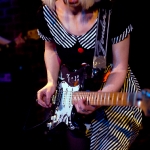
The Joy Formidable |
LATEST GALLERY IMAGES
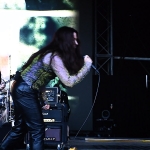
Alanis Morissette 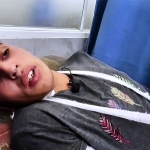
Where Israel Goes, Misery Follows |
|
|


